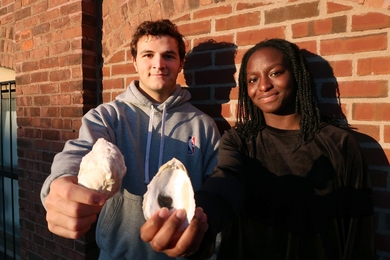Roland Bradford Greeley, professor emeritus of regional planning who served as director of admissions for 10 years during his 27-year career at the Institute, died on January 4 of heart failure. He was 88.
Professor Greeley directed the Admissions Office from 1961-72, a period when the Institute first began the effort to diversify its student and faculty populations. While he was well known for his planning work, his MIT admissions work "was a really important part of his life. The license plate my mother gave him for his car said 'ADMIT,'" said his daughter, Sally Anne Greeley Benson.
"During the period when Rolly was in charge, he brought us from a pre-World War II approach to admissions to the modern-day approach," said Peter Richardson, who served under Professor Greeley as associate director and subsequently became director following Professor Greeley's retirement.
The transition was not an easy one for the Institute, which finally opened its first women's dormitory, McCormick Hall, in 1967. Lack of appropriate housing served as a limiting factor on the number of women admitted for many years.
The 1960s shift in recruitment emphasis also required Institute faculty and administration to learn how and from where to recruit minority students.
Professor Greeley "found himself at the center of heated discussion, with people pushing and pulling in every direction, and with a staff that was not quite certain what to do to help. It was hard work, and Rolly kept us all on an even keel," said Mr. Richardson.
Before becoming director of admissions, Professor Greeley had already demonstrated his commitment to students through his participation on the Undergraduate Policy, Student Environment and Student Aid committees of the faculty. For two years he served as chair of the Freshman Advisory Council, a group of faculty members who were directly concerned with the counseling of first-year students.
"For him, admissions work was planning of a different sort--with people," his daughter said. "He was wonderful at interviewing people and making connections with them--wherever they were in the world. He always tried to make that personal connection."
Professor Greeley was also widely known for his work in the planning profession. He served as a consultant to numerous cities and agencies in the United States and abroad, including Thailand and India, and was a member of the consulting firm Adams, Howard and Greeley.
But the planning work that was perhaps closest to his heart was in his native Lexington, where he served on the Planning Board in the 1930s, and again in the sixties, holding the offices of secretary and chairman. He was also elected to the Board of Selectmen (1968-71) and held a seat on the Historic District Commission in the seventies. (Professor Greeley's father had played an active role in the Lexington community before him, serving as president of the Historical Society.) Among Professor Greeley's many contributions to his home town are the brown and white plaques he put up at historic sites on Massachusetts Avenue.
The January 7 headline for his page one obituary in the Lexington Minuteman read: "Local icon Roland Greeley dead at 88."
Professor Greeley received the AB from Harvard College in 1931 and attended the Harvard City Planning School from 1931-34. He was chief planner for the New England Regional Planning Commission from 1935-43 and a control engineer at the Federal Works Agency in Boston.
He joined the MIT faculty as an assistant professor of regional planning in 1945, was promoted to associate professor in 1947, served as acting head of the Department of City and Regional Planning (now the Department of Urban Studies) from 1951-52, and was promoted to professor in 1961.
He was a trustee of Mount Auburn Hospital and a member of the Massachusetts Trustees of Reservations and the Board of Governors of the American Institute of Planners.
Professor Greeley died in his twin sisters' home on Massachusetts Avenue in Lexington, the same house he lived in during his youth. "He spent his last week here, in the music room," said his sister, Anne Greeley Dutka. "His children and grandchildren were around the whole week. He was always very active in the First Parish Church and we had his bed where he could see it from the window. He could also see the Christmas tree, and we kept it lighted all the time for him."
Mr. Greeley's wife, Marion (Kimball) died in 1986. Just last month he suffered the death of his son, Warren Kimball, who died at age 57.
Professor Greeley is survived by three sons: William Bradford of Devon, PA, Edward Houghton of Nairobi, Kenya, and David McLean of Brooks, ME; a daughter, Sally Anne Greeley Benson of Bigelow, MN; twin sisters Ellen Greeley Bryant Warren and Anne Greeley Dutka, both of Lexington; 13 grandchildren and six great-grandchildren.
Funeral services were held on January 7 at the First Parish Church in Lexington.
Donations in Roland Greeley's memory may be sent to the First Parish Unitarian Universalist Church, 7 Harrington Road, Lexington 02421-4897 or to the Star Island Corp. (a Unitarian Congregationalist summer retreat off Portsmouth, NH), 110 Arlington St., Boston 02116-5302.
A version of this article appeared in MIT Tech Talk on January 13, 1999.






